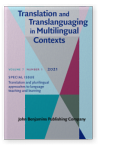Translation in the UK language classroom
Current practices and a potentially dynamic future
Pedagogical translation in UK secondary school language classrooms appears to have returned to favour after years of
demonisation brought about by Grammar Translation pedagogy and the rise of L2-only approaches. This renewed interest is reflected in the
recent inclusion of translation in the reading and writing sections of GCSE exams (taken by students in all countries within the UK except
Scotland). However, there is still some uncertainty around how translation is perceived and utilised in the language classroom. What
function has translation been thus far ascribed within language education? What could it be used to achieve? This article presents an
overview of where translation currently sits within the secondary Modern Foreign Languages (MFL) landscape in the UK. It then examines how
translation may be redefined as ‘dynamic’ and used as a communicative, creative activity to aid students with various aspects of their
language learning. Examples of such activities are provided and explained. Finally, recommendations are made as to how to make Dynamic
Translation accessible to students in future, namely through task-based translation projects and new forms of pedagogical translation
assessment.
Article outline
- 1.Translation in language teaching: The story so far
- 2.UK language education and TILT: Where we are now
- 2.1A step back in time for language teaching?
- 2.2Use of the L1
- 2.3Translation as a planned activity
- 2.4Translation as assessment
- 3.Problematising and redefining TILT
- 4.Dynamic translation: A theoretical underpinning
- 4.1What should DT look like?
- 4.2The value of Dynamic Translation
- 5.Example activities
- 6.Conclusions and recommendations
-
References
